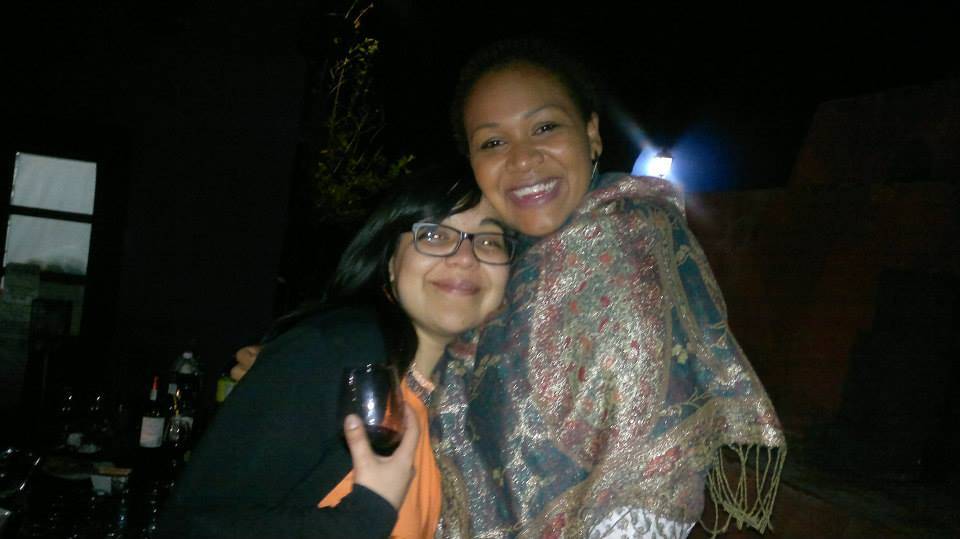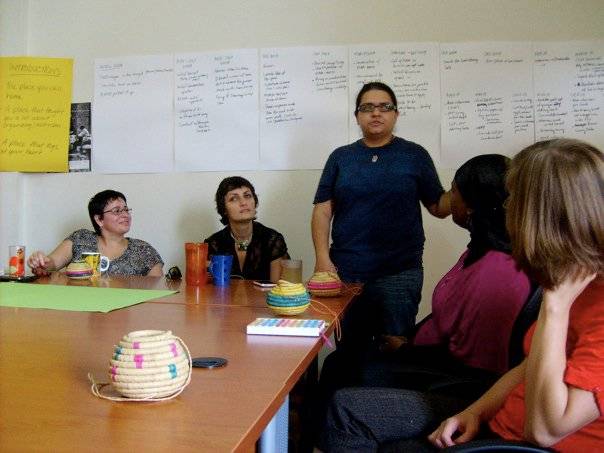Perla Vázquez Diaz, leader of Luchadoras TV and one of FRIDA’s founding advisors, started her activist work as a young feminist in Mexico, where she continues to be active until today. In her interview, Perla describes the start of FRIDA as a dream that became a reality beyond what she initially could have imagined.
In addition to being a founding advisor, Perla has played many formal roles at FRIDA. She is an outgoing Board Member, and we thank her for all her work and energy.

What is the story that led you to devote your life’s work to activism for women’s rights?
I grew up in a neighborhood called Iztapalapa, on the outskirts of Mexico City. Since I was fifteen years old, I started being part of ecclesial youth groups in my community. My weekends were dedicated to collecting food for people who needed it in my community. This allowed me to recognize the importance of transforming realities and how much each person can do in their life and in other people’s lives. But my involvement in a reflection about Easter, and the reason why we should not eat red meat, started to shift things.
I was a young woman who wanted to investigate a lot, and that’s where feminism gave me a couple of slaps. In this research, I discovered that red meat referred to carnal pleasures and that women were for more prohibited with this than men. I also understood the importance of “the images or saints” – the virgin Mary, or Guadalupe – their power was based on being immaculate, in the denial of their own sexuality. I discovered that the burdens and controls were only for women. If you were a man you had many more freedoms. It was a great teaching, it looked so unfair.
So, at age sixteen, I identified myself as a furious young person and feminist, from a marginal neighborhood in Mexico City. Since then, I didn’t stop until I met other feminists, to understand the movements and recognize all the inequalities that affect us just for being “women” and “young.” And evidently, I became agnostic.
Can you tell us how you got involved in FRIDA for the first time? Where does the story begin for you?
My story with Frida is a dream … A dream of many more that became true. In my activism as a young feminist, I was involved in Elige, an organization of young feminists. We sought to stand for young feminists of Latin America. Like REDLAC, we made meetings, we did feminist schools, we participated in various feminist meetings, including the feminist Dialogues that were organized around the World Social Forum in Porto Alegre in Brazil, in 2005. At that time, we heard about the AWID research, ‘Where is the money for women’s rights?’ The results impacted several young feminists groups who were organized in the region of Latin America. Many of us managed financing with much precariousness, with very little and sometimes nothing, and yet we did a lot. There we discovered that the priority for many funders was us, but we lived a different reality: we saw collectives that were created and then nobody supported them and they disappeared. We also participated in a process of formation by Women’s Fund Semillas in Mexico that changed the way we were thinking about how, as activists and feminists, we should heal our relationship with money. We should manage it with greater dignity, recognizing that our contribution needs to be acknowledged. This would help us to have sustainability in our movements. There, everything was transformed … We had data and reflections to manage our money from more dignified places.
I was at the AWID Forum in South Africa in 2008 when I was 26 years old. Despite the fact that many young Latin American feminists did not speak English, we managed to get along with other young feminists from Eastern Europe, Africa, Asia, and the Arab region, who discussed and lived similarly, like us. We needed to manage more money for the revolutions of young feminists. Me being there, with all our past history, found other dreams in that global forum.
After the forum, we organized a regional meeting in Brazil, like REDLAC, to discuss with donors how to better support the young feminist organizations in the region, and the truth is that we had almost no attendance. Later we learned that there were other meetings of young feminists organized by AWID and FCAM, in other regions of the world, where the idea of a fund from and for young feminists was beginning to take shape. At that time, I was invited to be part of the meeting in Beirut to materialise our collective dream.
Tell us about the meeting that gave birth to FRIDA in Beirut in 2010: what was the energy in the room? Any particular story that you can share about that day?
Just let me put that in context for you, I was a Latina in Beirut. The simple fact that I was visiting an Arab country escaped my most creative fantasies. It was not only an inexplicable place for me, but I was also with young feminist colleagues who were brilliant (most of us knew each other and respected one another a lot, because of the diversity of contexts we came from), and we were with the mission of making this dream real.

The headquarters was organized by Nadine Moawad, a young feminist who, in addition to collaborating with AWID, was part of a large group of young feminists in Beirut. We held the meeting in their offices. Nadine could not have done better. The creation of a feminist youth fund did not need luxury, it needed ideas and young feminists to recognize the path that many organizations had already gone through. It needed to recognize that not only were there many groups, but they were so diverse in each part of the world.
In addition to that, I remember the great Lebanese food, the beautiful cats that guided us, and that we partied as inspiration with the young feminists who had places of resistance and enjoyment that I had never imagined in Beirut.
Looking back on the experience of taking the Fund to where it is now, is there any time that stands out for you?
It is a complicated question. I did not only found FRIDA. I also spent eight years accompanying, suffering and enjoying the creation and consolidation. In November 2017, I officially left the FRIDA Board. So there are many moments. I think a significant moment is when we decided that it would be called FRIDA. We had already released a call with different names and nothing convinced us. At the time, Amina Doherty was the coordinator and our only person hired. She suggested, ‘Why not FRIDA?’ The name is a reference of a powerful woman, Frida Kahlo, but also had some meaning in Africa. And I remember, that being the Mexican of the group, it seemed to me that it could not be inclusive. I had not calculated how powerful that name would be for us. Years later, as in an act of asking permission from Frida Kahlo herself, we had the presentation of the Fund in the Blue House of Coyoacán, where we began a new stage of the Fund. I think those moments were very symbolic.
Why was a young feminist fund important when it was founded? Why is it important today?
From a very young age and even more now at 36 years of age, I am convinced: the youth support the movements of political and social transformation, they have done it throughout history. Investing in the movements of young feminists is to guarantee that we can transform history and improve this world, in various corners of the planet. That is why FRIDA is important, because we need to invest more and more in the feminist revolutions, which will make this world a better place.
Have there been moments in your personal journey in which remembering / recognizing the past has strengthened your activism?
Recently, I did a workshop that I called “Recognize your ancestors” from my activism space, Luchadoras.MX. This workshop was iconic for me, because it was about how we can walk with greater strength and strategy when we looked to the past. For me, this has been a great learning. It is not only about understanding and recognizing women of my own “lineage,” or my “mother,” but also recognizing the history and feminist theory that allows us to better understand the place we inhabit today. If you feel disoriented, sad or lonely, spend time with a feminist. Speak with your girlfriend, your friends, your mother or your aunts, and you will see that we are never alone.
As told to Christy Selica Zinn, a young feminist consultant working at the intersection of women’s rights, youth development and organisational change in Sub-Saharan Africa. She is especially interested in the physical body as a political entity and bearer of memory. She is based in Durban, South Africa.
All designs by Pearl D’Souza.